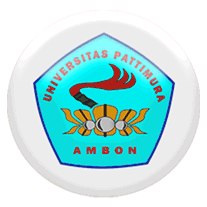SIMETRISASI BENTUK KANONIK JORDAN
Abstract
If the characteristic polynomial of a linear operator is completely factored in scalar field of then Jordan canonical form of can be converted to its rational canonical form of , and vice versa. If the characteristic polynomial of linear operator is not completely factored in the scalar field of ,then the rational canonical form of can still be obtained but not its Jordan canonical form matrix . In this case, the rational canonical form of can be converted to its Jordan canonical form by extending the scalar field of to Splitting Field of minimal polynomial of , thus forming the Jordan canonical form of over Splitting Field of . Conversely, converting the Jordan canonical form of over Splitting Field of to its rational canonical form uses symmetrization on the Jordan decomposition basis of so as to form a cyclic decomposition basis of which is then used to form the rational canonical matrix of
Downloads
References
J. B. Fraleigh, A First Course in Abstract Algebra, Seventh Edition, New York: Addison Wesley, 2003.
Kenneth Hoffman, Ray Kunze, Linear Algebra, New Jersey: Prentice-Hall, Inc, Engliwood Cliffts, 1971.
M. Radjabalipour, "The Rational Canonical Form Via The Splitting Field", Journal of Linear Algebra and Its Applications, pp. 2250-2255, July 2013.
M. Radjabalipour, "A Symmetrization of The Jordan Canonical Form", Journal of Linear Algebra and Its Applications, pp. 94-112, 2017.
S. H. Weintraub, Jordan Canonical Form, Theory and Practice, Washington: Morgan and Claypool Publisher, 2009.
Authors who publish with this Journal agree to the following terms:
- Author retain copyright and grant the journal right of first publication with the work simultaneously licensed under a creative commons attribution license that allow others to share the work within an acknowledgement of the work’s authorship and initial publication of this journal.
- Authors are able to enter into separate, additional contractual arrangement for the non-exclusive distribution of the journal’s published version of the work (e.g. acknowledgement of its initial publication in this journal).
- Authors are permitted and encouraged to post their work online (e.g. in institutional repositories or on their websites) prior to and during the submission process, as it can lead to productive exchanges, as well as earlier and greater citation of published works.






1.gif)



